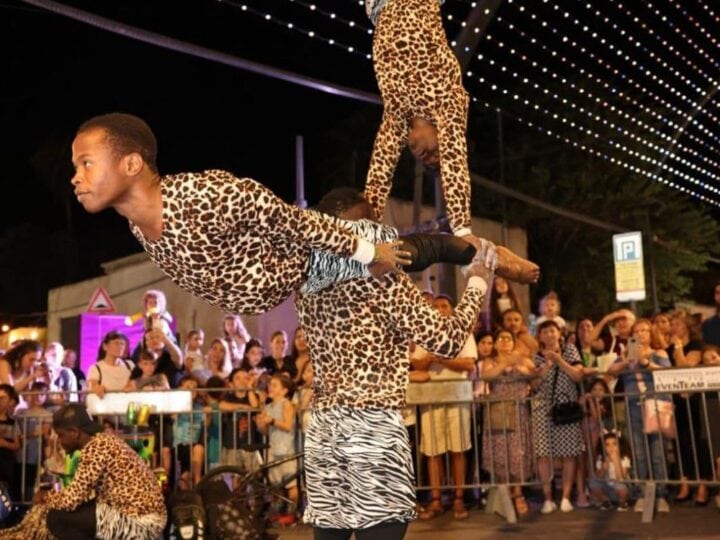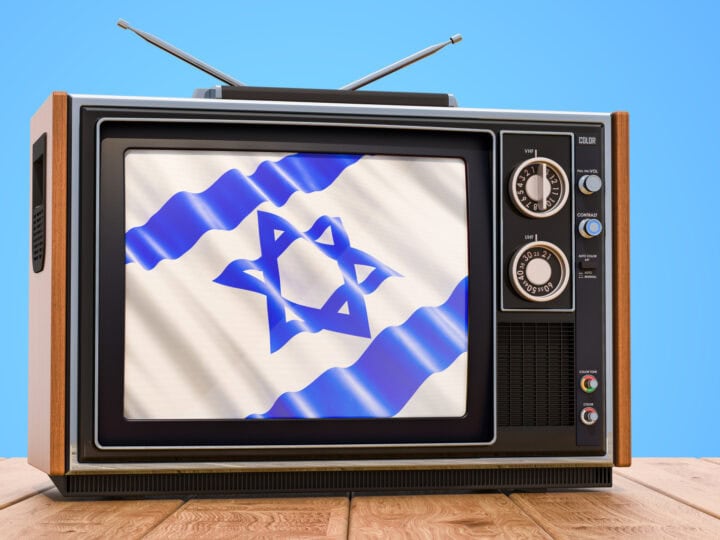Nearly 8,500 people from Israel and 50 other countries – including Saudi Arabia – have responded to an Israeli-American family’s appeal for hospital volunteers should they be needed during the war.
“The response has been overwhelming,” says nurse practitioner Eliana Marcus Aaron, founder of Israeli medical management and health advocacy company EMA Care.
Aaron and her brother Yigal Marcus, head of the Tel Aviv office of global asset management firm AllianceBernstein, are running their emergency-preparedness project with the help of volunteers set up at the Marcus family home in central Israel.
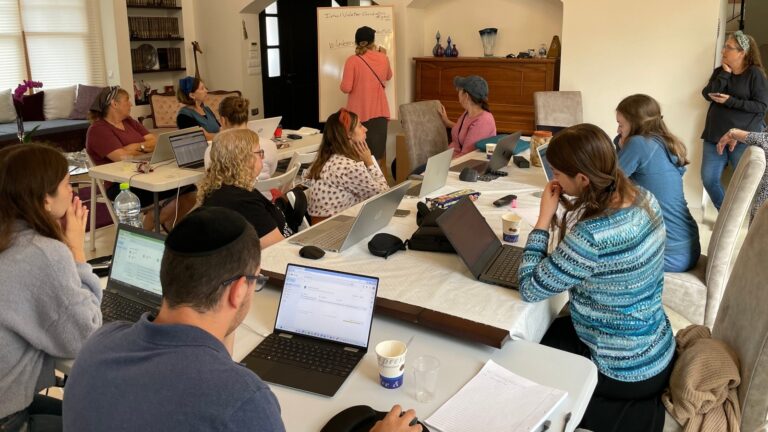
When the war started on October 7, the five Marcus siblings were in Eilat celebrating the 80th birthday of their father, rheumatologist Dr. Ralph Marcus of Jerusalem. Originally from Teaneck, New Jersey, everyone in the family now lives in Israel except two brothers, both physicians in Florida.
Before his brothers flew home on October 9, Yigal Marcus asked if they would come back to Israel and volunteer in hospitals if needed.
“They of course said ‘yes.’ My wife, hearing that conversation, sent out a WhatsApp to a group of her friends: ‘If anyone knows any medical professionals who would consider volunteering in Israel, please call my husband.’ That WhatsApp message went viral globally, and my phone started ringing off the hook with thousands of calls.”
5,300 in 48 hours
At that point, Marcus sought the help of his older sister Eliana.
She has a PhD in nursing practice from Yale and is a US State Department-trained expert in pandemic and emergency planning. During the coronavirus pandemic, she helped the Israeli Health Ministry develop policies for the English-speaking population, tourists and foreign students.
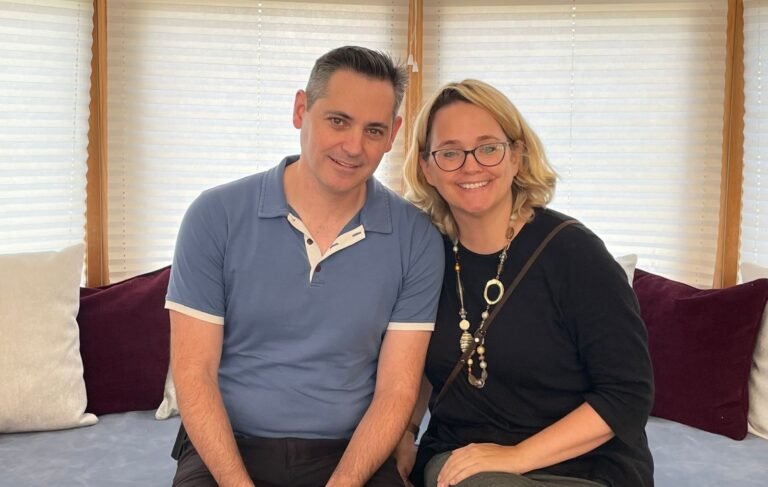
Aaron reached out to her contacts at the Health Ministry and Israel Medical Association, offering to oversee the paperwork and procedures for the project, which the siblings dubbed Mission Hinenu – “here we are” in Hebrew, a phrase implying readiness to meet a challenge.
“Very quickly we ramped up and created a form that went equally as viral as the WhatsApp message,” says Marcus.
Within the first 48 hours, more than 5,300 medical personnel and non-medical personnel signed up on a secured database.
Continuing to get the word out through social media and organizations including Yad L’Olim and a grant from the Orthodox Union, more and more potential volunteers have been stepping forward.
“According to the Ministry of Health, 150 to 200 mostly medical volunteers have already been brought in,” Aaron tells ISRAEL21c.
Processing paperwork pronto
One of Aaron’s first tasks was to develop credentialling protocols enabling anyone with valid medical licensing in Israel, the United States, Canada or the European Union to volunteer.
“We need to start pre-processing these potential volunteers because you can’t wait until it’s an emergency,” Aaron explains. “We don’t have any regulatory authority. But we speed up the process by giving the ministry a complete package, having already verified their documents and qualifications.”
In addition to physicians, physician assistants, nurses, nurse practitioners, therapists and psychologists, Aaron says hospitals and nursing homes desperately seek volunteer pharmacists.
“As the war progresses, needs change. We’ve created a strong organizational system where, with a touch of a button, we could extract the people we need efficiently,” says Aaron. She’s been assisted with the technology and workflows by a dedicated volunteer crew of professionals, mostly women.
The pre-clearance forms created by Hinenu in English, in cooperation with the Ministry of Health, make this possible.
For example, recently three senior physicians from United States came to volunteer at Galilee Medical Center in Nahariya: Dr. David Zeltsman and Dr. Mark Kissin from Long Island Jewish Medical Center in New York, and Dr. Louis Profeta from Ascension St. Vincent Hospital in Indianapolis, Indiana.
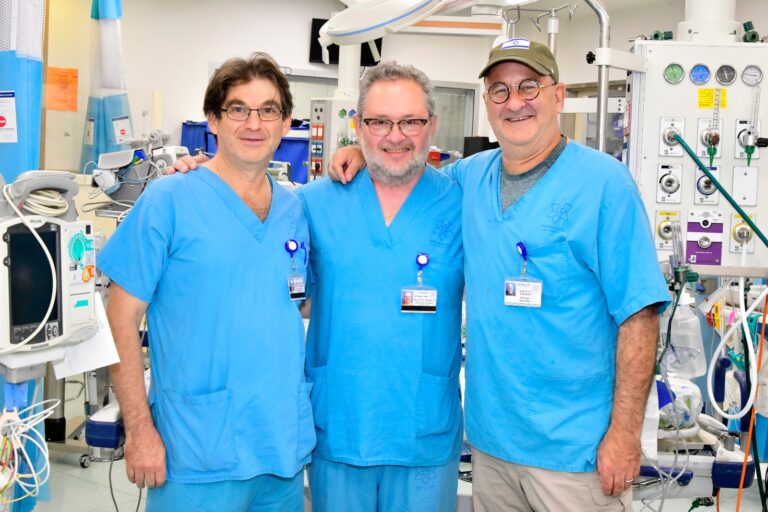
Profeta, a specialist in emergency medicine, is instructing interns in treating trauma victims.
“This is my fourth visit to Israel, and the first time I am volunteering at a hospital,” he said.
“About 15 years ago, I attended a weeklong seminar called the Emergency Response Group at the Galilee Medical Center, as part of the hospital’s collaboration with the Jewish Agency’s Partnership2Gether Western Galilee program. During the seminar, we learned from Galilee Medical Center’s experiences and expertise in the field of trauma injuries and mass casualty events. Now I am sharing knowledge I acquired here with the residents at the medical center. For me, it’s the closing of a circle.”
Dr. Tsvi Sheleg, deputy director of the medical center, said, “It warms the heart to see such senior doctors who drop everything — work and family — and come to us to volunteer. Beyond the professional dimension that they are contributing, they are committed and sensitive people, who are also contributing to the atmosphere of solidarity at the medical center and the sense of a shared destiny.”
Nonmedical personnel
Aaron says there is an urgent need at Israeli hospitals for volunteers to do nonmedical jobs, too: transporting patients, distributing food and feeding patients, logistics, supply stocking and administrative tasks.
These duties are usually performed by staffers who are now serving in the reserves or unable to come to work for other war-related reasons.
The Health Ministry’s Emergency Operation Center asked Aaron to supervise volunteer placements of nonmedical personnel in all Israeli medical institutions.
“People don’t realize how important this is. We created a second division with 15 people working on that effort,” she says.
One hospital contacted Aaron on October 12, seeking babysitters for children of medical personnel on Friday and Shabbat, the Israeli weekend.
“I didn’t have anyone on my volunteer list from that city, but we were able to network into the religious community there, who then connected us to a youth leader who was able to staff those slots,” she tells ISRAEL21c.
“On Friday morning I called the head of human resources and said, ‘I’m sending you babysitters from the community. Use them. They want to help you.’
“She called me back tearfully on Saturday night, and said, ‘You don’t know what you did for us.’ It’s an example of something so simple that saved lives and allowed the hospital to function.”
Overcoming language barrier
The Health Ministry has appointed three organizations to deal with logistics for foreign volunteers.
“We are working with the Ministry of Health and health institutions to assist with processing volunteer candidates,” says Aaron. “This reduces the workload for the ministry’s credentialing team. We are also researching other partnerships to provide mental health support and services to Israeli displaced refugees; ways to help improve healthcare access for displaced people; and other areas in the health arena.”
Language and other barriers to integration, Aaron says, can be overcome. Most Israeli and foreign healthcare workers have some level of English competency, and every Israeli hospital has a fast-track orientation program for new personnel.
“It’s a war, and although having a volunteer come into a system is not ideal, the facilities requiring help have processes in place and pair them with a translator if necessary,” says Aaron, who moved to Israel in 2002.
Marcus, who arrived in 2016, said his firm “told me not to worry about the office, freeing me up to do what we can do for the country. Some of our Israeli staff is also volunteering to help us. And we’ve gotten active operational support from technology companies including Monday.com, which gave us free software.”
Secure volunteer sign-up links can be found on the EMA Care website and the Health Ministry’s website.















